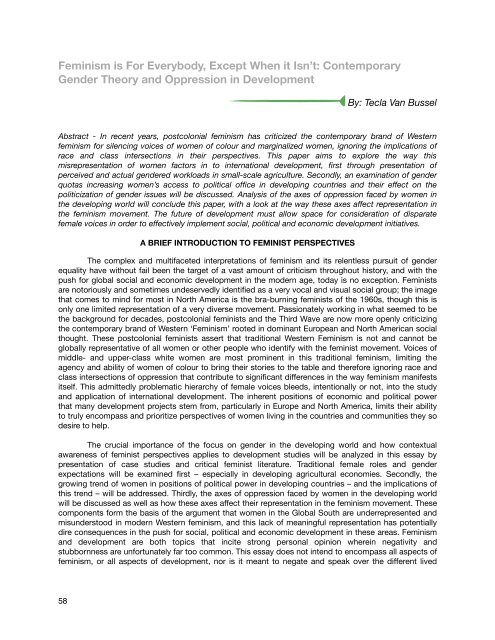Undercurrent-Issue-Fall-Winter-2014-3
Undercurrent-Issue-Fall-Winter-2014-3
Undercurrent-Issue-Fall-Winter-2014-3
Create successful ePaper yourself
Turn your PDF publications into a flip-book with our unique Google optimized e-Paper software.
Feminism is For Everybody, Except When it Isn’t: ContemporaryGender Theory and Oppression in DevelopmentBy: Tecla Van BusselAbstract - In recent years, postcolonial feminism has criticized the contemporary brand of Westernfeminism for silencing voices of women of colour and marginalized women, ignoring the implications ofrace and class intersections in their perspectives. This paper aims to explore the way thismisrepresentation of women factors in to international development, first through presentation ofperceived and actual gendered workloads in small-scale agriculture. Secondly, an examination of genderquotas increasing women’s access to political office in developing countries and their effect on thepoliticization of gender issues will be discussed. Analysis of the axes of oppression faced by women inthe developing world will conclude this paper, with a look at the way these axes affect representation inthe feminism movement. The future of development must allow space for consideration of disparatefemale voices in order to effectively implement social, political and economic development initiatives.A BRIEF INTRODUCTION TO FEMINIST PERSPECTIVESThe complex and multifaceted interpretations of feminism and its relentless pursuit of genderequality have without fail been the target of a vast amount of criticism throughout history, and with thepush for global social and economic development in the modern age, today is no exception. Feministsare notoriously and sometimes undeservedly identified as a very vocal and visual social group; the imagethat comes to mind for most in North America is the bra-burning feminists of the 1960s, though this isonly one limited representation of a very diverse movement. Passionately working in what seemed to bethe background for decades, postcolonial feminists and the Third Wave are now more openly criticizingthe contemporary brand of Western ‘Feminism’ rooted in dominant European and North American socialthought. These postcolonial feminists assert that traditional Western Feminism is not and cannot beglobally representative of all women or other people who identify with the feminist movement. Voices ofmiddle- and upper-class white women are most prominent in this traditional feminism, limiting theagency and ability of women of colour to bring their stories to the table and therefore ignoring race andclass intersections of oppression that contribute to significant differences in the way feminism manifestsitself. This admittedly problematic hierarchy of female voices bleeds, intentionally or not, into the studyand application of international development. The inherent positions of economic and political powerthat many development projects stem from, particularly in Europe and North America, limits their abilityto truly encompass and prioritize perspectives of women living in the countries and communities they sodesire to help.The crucial importance of the focus on gender in the developing world and how contextualawareness of feminist perspectives applies to development studies will be analyzed in this essay bypresentation of case studies and critical feminist literature. Traditional female roles and genderexpectations will be examined first – especially in developing agricultural economies. Secondly, thegrowing trend of women in positions of political power in developing countries – and the implications ofthis trend – will be addressed. Thirdly, the axes of oppression faced by women in the developing worldwill be discussed as well as how these axes affect their representation in the feminism movement. Thesecomponents form the basis of the argument that women in the Global South are underrepresented andmisunderstood in modern Western feminism, and this lack of meaningful representation has potentiallydire consequences in the push for social, political and economic development in these areas. Feminismand development are both topics that incite strong personal opinion wherein negativity andstubbornness are unfortunately far too common. This essay does not intend to encompass all aspects offeminism, or all aspects of development, nor is it meant to negate and speak over the different lived58


